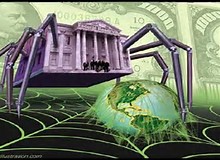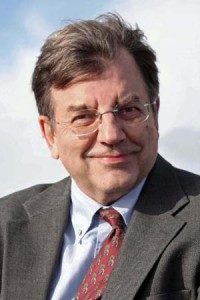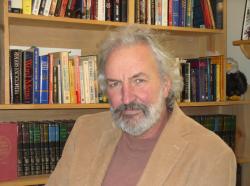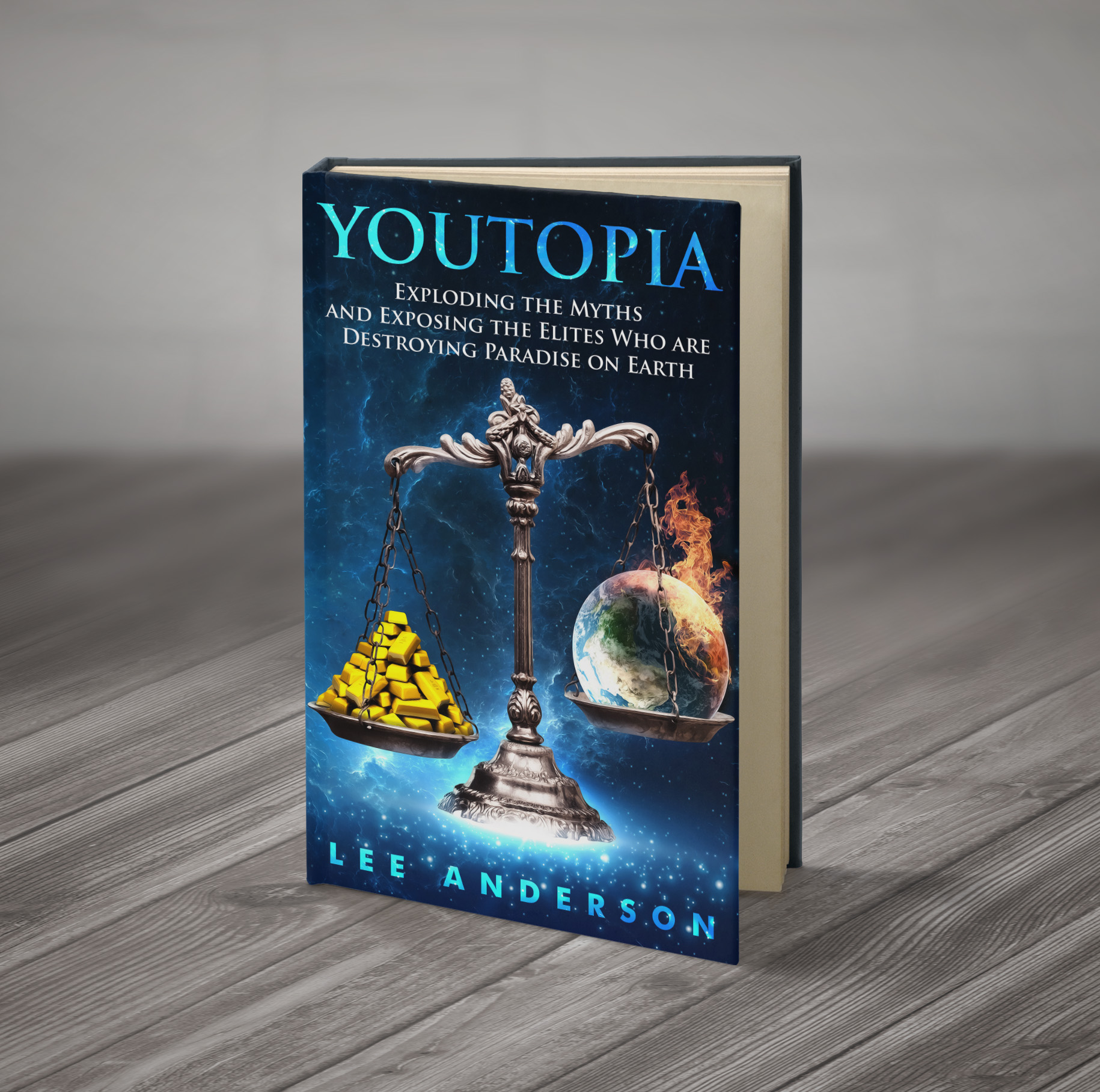Youtopia is dedicated to the proposition that our…
024 Seizing the Commons Part 1: Public Banks, Organic Economics

Temple of Tyranny, Goldman Sachs Intergalactic Headquarters
“Problems cannot be solved by the same level of thinking that created them.”—Albert Einstein
Of course he’s right again. We need to move away from complaining about our ultra-corrupt financial/political system that some still refer to as a democracy, but in reality is a metastasizing oligarchy, and avow ourselves to designing a completely new system. When auto, airplane or motorcycle designers and other engineers realize their current model has met its limits they abandon their old platform and proclaim a “completely new design” or “brand new from the ground up,” or “we started from a clean slate.”
We simply cannot can tweak and tune our way to a more equitable, fair and balanced financial/political archetype because the existing infrastructure is insidiously flawed. The current financial/political system punishes or at least diminishes real workers and rewards parasitic greed. Of course there is a barely tolerable level of grey area between those two, but no one can deny the gap between ultra-rich and dirt poor grows so wide the middle class teeters on the edge of the viability fault line. Or as George Carlin put it, the middle class does all the work and pays most of the taxes and the poor are there to scare the shit out of the middle class.
I’m not alone in recognizing the futility of our current financial/political parasitic paradigm. I’ve always been a big fan— back in the days of newspapers—of reading letters to the editors and nowadays I scan on-line comments because I’m interested in what other people have to say in response to the syndicated pontifications by the CFR-approved media. There is no argument that the chorus against parasitic capitalism is growing and recently I came across one comment that struck a chord, “The level of corruption is almost complete,” one person lamented. And so it seems at times that many have become cynical and feel despondent. The Council on Foreign Relations (CFR) and the Mockingbird media pared down the presidential candidates to Trump and Hillary, so they had the ambitions of empire covered no matter what the disabused voters decided. We are now living with the results of an election rigged by oligarchy.
Most everyone knows by now venal politicians are controlled by their financial and corporate sponsors, we know “lobbying” is just a euphemism for bribery. We know banksters can crush the economy and toss people out of their homes and pay themselves obscene bonus for their trouble. The Italian Mafia has shrunk from public perception because they are little leaguers compared to the organized crime matrix that owns most of the world’s governments.
The redesign, in this case, starts with seizing the commons, here is Wikipedia’s definition and it serves as a decent starting point.
The commons is the cultural and natural resources accessible to all members of a society, including natural materials such as air, water, and a habitable earth. These resources are held in common, not owned privately.
In this Part 1 of Seizing the Commons, I want to stress that money, legal tender, is certainly one of the things, perhaps the most important thing, behind air and water, that we all have in common, yet the public does not own nor control the production or distribution of our common currency.
As Einstein said, we need to change our thinking. One way is to think outside the box, or in this case, outside the planet. Any attempt at tweaking this system will invoke too many stigmatized “isims:” socialism, communism, fascism, corporatism, etc. But if we engaged in a grand redesign of what an economy should look like should we happen to inherit a NEW Planet, with no established systems, now we can start fresh, from a clean slate, from the ground up. I realize we are not likely headed for a new planet anytime soon, what I’m proposing is an academic exercise, perhaps one that should be conducted in schools and universities.
We need to imagine what kind of economic system we would want to set up if we could start fresh. The first thing we would want to do is define a mission statement, the mission statement should prioritize quality of life for all, freedom and equal opportunity in pursuit of a utopian society. I understand the word “utopian” has many negative connotations based on historical atrocities committed by misbegotten utopianists, and I run some of these down in the introduction of my book Youtopia. What I refer as a utopian society is one where people live in harmony with nature and with each other, free of war, free of exploitation, free of prejudices and bigotries. The missing ingredient is YOU. A world where most people work to obtain and distribute the things we need and want, yet are not slaves to synthetic financial objectives set up by parasitic overlords who despise actual work and actual workers, such as we have today. The more people chip in to do the work, the more free time will be available to reap the rewards of that work.

Private Banks, picture from Ellen Brown’s Web of Debt.
So with a utopian society in mind, we would not want a system like we have here on earth where money begets more money. Real economics would have more real work creating more wealth. We, in good conscience, would not deliberately design a new world with a financial system that rewards predation and parasitic capitalism and inherited wealth as an entitlement. Any new design of a financial system would have to hold to the mission statement and be altruistic and provide opportunity for everyone. This is not to say the economy would be homogenized, that everybody would be entitled to the same things everyone else has, but an altruistic economy would reward work and contributions to society.
The opportunity to engage in a productive economy and society will diminish the massive numbers of people such as we have today who have “fallen through the cracks,” at the lower end of the income level and need assistance, while offering a better quality of life to those at the top end of the financial spectrum today who are unhappy because they have confused quantity with quality and, the void they feel manifests as insatiable greed and materialism.
This new from the ground up economic system could be thought of as organic economics, a natural evolution from barter to a currency based on barter and real earned income, real production of goods and services in exchange for real goods and services produced by others.
The insidious epicenter of our dystopian financial system is the well spring of most all corruption, and that is the fact our common currency was hijacked years ago by private banksters. So the first thing in seizing the commons is to cut out the cancerous private control of common currency, and create PUBLIC BANKS starting with the privately owned and controlled Federal Reserve. The head of a real Public-owned People’s Bank would be elected by We the People and have a set income, lower than the political head, would have no political affiliations, no corporate affiliations and no opportunity to leverage their position into a lucrative lobbying job after his or her tenure was over. The People’s Bank would produce and distribute our currency as dictated by the mission statement. There would be complete transparency and public debate on financial matters would be encouraged. More about public debate in an upcoming Seizing the Commons: Public Discussion Media. The Public Banking system would facilitate organic economics.
To be clear, organic economics, doesn’t have a lot to do with the economics of organic gardening or organic food, although it does include organic food as a component of a comprehensive, benevolent economic system. What I refer to is an economic system that would have evolved organically, naturally, wholesomely, if not for the constant synthetic engineering of economic systems which transfer wealth from working people to the financial overlords. Organic economics is the system that should have evolved naturally as a means to facilitate barter, to fund large infrastructure projects and socially supportive endeavors which help civilizations remain civil and nurturing as opposed to the aggressive winner-take-all synthetic economics we have today.
This synthetic engineering of the means of producing and distributing money started way back before medieval days as kings and queens, emperors and monarchs commanded their wizards and high priests to conduct alchemical experiments aimed at turning common lead into rarefied gold. The desire to turn money into a commodity unto itself is a perversion of the organic usefulness of money as representative of the value of work, of turning the intelligent application of labor into useful goods and services, as a means to facilitate barter for real, tangible goods and services.
Money from Nothing, long a desire of financial alchemists
Not only has history proven this desire to create wealth from nothing to be an imprudent move, but the motive for wanting easy money was even more reprehensible as these potentates were desperate for wealth and needed to fund armies so as to wage war on other potentates in order to gain more property, more power and, of course, more money—rinse off the blood, wash and repeat throughout history.
For many years the Church forbade usury, we all recall when Jesus turned over the tables of the money changers in the Temple of worship. What might he think of today’s multi-millionaires and their mega churches?

“And Jesus went into the temple of God, and cast out all them that sold and bought in the temple, and overthrew the tables of the moneychangers, and the seats of them that sold doves, And said unto them, It is written, My house shall be called the house of prayer; but ye have made it a den of thieves.” — Matthew 21:12–13
The advent of the Frankish Carolingian Dynasty, perhaps, was an epoch in history when the mayors, the financial managers of the kingdom, usurped the Royal lineage of the Merovingian Dynasty, it was a point when the day-to-day managers (mayors) of the kingdom or city states became more powerful than the titular heads of state, even when the state merged with the Almighty Church.
The usurpation by banksters over the elected officials continued, reaching a zenith with the Medici family of Florence, Italy. Although the Medicis made great contributions to the arts and sciences and are renowned for helping usher in the Renaissance, they also stand as a stark example of how banksters overhauled the political, royal heads of state, relegating the official statesmen to titular puppets.
An excerpt from World History.net on the Medici’s rise to power and eventually collapse.
—The Medici are the first princely dynasty to win their status not by warfare, marriage or inheritance but through commerce. They come to Florence in the 12th century from the nearby countryside. Their ancestral home is in the Mugello valley.
During the next two centuries the family, amassing a fortune through banking and trade, begins also to play a prominent part in Florence’s political life. As yet the Medici are merely one among several similarly influential families. Their special status derives from the activities in the early 15th century of Giovanni – known as Giovanni di Bicci.
Giovanni di Bicci increases the Medici wealth to unprecedented levels. He also uses it discreetly for political purposes in a manner which will be perfected by his son, Cosimo.
Cosimo de Medici
Cosimo de’ Medici earns for himself the posthumous title pater patriae (‘father of the fatherland’). It acknowledges his great contribution to the enhanced status of Florence. But it also contains, to modern ears, a hint of the method behind his power—with its echo of a mafia godfather. Cosimo never occupies an official position as head of state. He remains a private citizen, running affairs by a network of behind-the-scenes alliances which benefit his own faction and ruin his enemies.
(Could this be a forerunner of Goldman Sachs?)
From 1434 Cosimo de’ Medici is unmistakably the most powerful man in Florence, even though his family’s cause has suffered a severe setback in the previous year. In 1433 he is arrested by a rival faction. Bribes and well-placed friends save him from death. He is exiled for ten years, but from Venice he controls a Florentine party working for his return. It is only a year before they succeed. Cosimo is invited back, and his rivals are banished—more effectively—for life.
During a reign of 30 years, Cosimo uses his fortune to maintain absolute control over the internal affairs of Florence. Opponents find themselves squeezed to financial extinction.—
This slide toward synthetic economics continued under the Vipers of Venice, an era some historians consider as the birth of fascism.
https://www.youtube.com/watch?v=VRfR6tvUZKs
Synthetic economics congealed further with the The Bank Charter Act of 1844 giving a monopoly on the issuance of money to the Bank of England.
. . . sometimes referred to as the Peel Banking Act of 1844, was an Act of the Parliament of the United Kingdom, passed under the government of Robert Peel, which restricted the powers of British banks and gave exclusive note-issuing powers to the central Bank of England. It is one of the Bank of England Acts 1694 to 1892.
Until the mid-nineteenth century, commercial banks in Britain and Ireland were able to issue their own banknotes, and notes issued by provincial banking companies were commonly in circulation.
Under the Act, no bank other than the Bank of England could issue new banknotes, and issuing banks would have to withdraw their existing notes in the event of their being the subject of a takeover. At the same time, the Bank of England was restricted to issue new banknotes only if they were 100 percent backed by gold or up to £14 million in government debt. The Act served to restrict the supply of new notes reaching circulation, and gave the Bank of England an effective monopoly on the printing of new notes. The Act exempted demand deposits from the legal requirement of a 100-percent reserve which it did demand with respect to the issuance of paper money.
The ancient banksters learned that the best and safest loans were to their respective governments because the heads of state assured repayment by taxing the plebeians. When banksters started gaining, not earning, huge profits merely from loaning, that began the slide to oligarchy, where the citizen workers lost control over organic economics. For a civilization to remain free and vital, money should be a “common currency,” but the early banksters bent themselves toward the capture of exclusive production and distribution of money, they sought and got a monopoly.
And by now most people have already come up to speed on the insidious birth and mandate of the Federal Reserve, which is privately owned and controlled usually by Goldman Sachs high priests of synthetic economics, and Goldman usually supplies the heads of the “government agency” overseeing the Federal Reserve and the Treasury Department. Donald Trump, who gained political points during his campaign for calling out Hillary Clinton’s ties to Goldman Sachs, has no less than six Goldman Sachs banksters overseeing his day to day economic policies, and the current budget proposal that increases military spending while decreasing social programs is one example of the malevolence of synthetic economics.
President Donald Trump has selected yet another Goldman Sachs executive to fill a senior role in his administration, naming the firm’s current managing director, James Donovan, to serve as deputy Treasury secretary.
Donovan would be the sixth member of Trump’s team with ties to Goldman, which was once described (by Matt Tiabbi in Rolling Stones) as “a great vampire squid wrapped around the face of humanity, relentlessly jamming its blood funnel into anything that smells like money.”
Donovan’s now-boss, Treasury Secretary Steven Mnuchin, also worked at the investment bank. National Economic Council director Gary Cohn; White House senior counselor for economic initiatives Dina Powell; and chief strategist Steve Bannon also formerly held positions within the very institution that Trump pointed to on the campaign trail as a symbol of Wall Street corruption and greed. Jay Clayton, Trump’s nominee to lead the Securities and Exchange Commission (SEC), was a Goldman Sachs attorney.
Ancient history’s second tier money managers became today’s overlord international banksters, and the banksters don’t need gold, they have created fractional reserve banking where they turn debt for the masses into profits for the few, and enforce their synthetic economics, (i.e., predatory investment capitalism) with a quiver full of financial instruments resulting in den of parasites and high frequency trading machines, buying and selling everything from pork bellies, to missiles, to collateralized debt obligations, i.e., packaged home debts with other financial derivatives—derived, of course from the original, organic labor which precedes all synthetic wealth, but is conveniently overlooked by the alchemical wizards of Oz.
The clever financial gladiators of today can twist and turn every ounce of sweat and blood by the working class into ill-gained synthetic profits; they can use their media as a broadsword to parry and thrust against meek overtures of regulations and remain free to casino-gamble our organic money derived from labor on everything from depleted uranium cannon rounds, to white phosphorus artillery rounds, to soil destroying chemicals, to synaptic interfering pharmaceuticals, to justifying economies of scale clear-cuts and fish destroying factory runoff in our rivers. They have created a money-makes-more-money synthetic system where technocrats who develop time-wasting trivial games and social-gossip distractions, make fortunes that would make Midas blush, and the magic of interest makes their fortunes metastasize until a handful of billionaires have more wealth than the bottom half of the planet, according to the most recent Oxfam study. In fact the trendy practice today is for corporations to buy their own stock, driving up the price, then selling out resulting in huge bonuses for the CEOs and board members. This was the practice of infamous energy trader Enron. This is purely parasitic, narcissistic capitalism and is explained as Junk Economics, in the new book and interview by Economics professor Michael Hudson. Here is the first of a five part series on The Real News Network.

Michael Hudson, World Class Economist, a supporter of Public Banking
And in an interview from Counterpunch on March 15, 2017 by Adam Simpson, Hudson explains the difference between classic economics and what I call synthetic economics.
—Modern Monetary Theory (MMT) school of thought. The term simply means not mainstream. We’re basically classical economists. We do what classical economics used to do, which is to distinguish between earned and unearned income; and between productive versus unproductive labor. And we see that banks create credit—which governments could create just as easily, along more socially and economically productive lines.
If you’re looking at how wealth is accumulated, people think of it in the way textbooks describe: as earning income and saving it up to get rich. But that’s not how it happens at the top of the pyramid. Most wealth takes the form of capital gains. They’re inflated on credit, so it’s really asset price inflation that’s financed by debt leverage. Most of the gains end up being paid out as interest, so the bankers – that is, the bank owners and bondholders – end up with most of the rise in wealth.
If you’re a financial manager, you look at what’s called total returns. You add the capital gain to your current income. Most capital gains are obtained in the economy’s largest sector, which doesn’t appear in the academic curriculum: real estate, followed by oil and gas and other natural resource extraction. But to look at academic economics, it’s as if the whole economy is about making things – as if manufacturing hires labor to produce goods and services that everybody gets rich from, by being more productive. Savings are supposed to finance growth, increasing stock prices because profits go up from employing more labor to produce more goods and services.
But that’s not really what happens. Most money is made by financial engineering, not by industrial engineering. It’s made by what the classical economists called unearned income. 80 percent of bank loans are to the real estate sector. The more loans banks make to the real estate sector, the more their credit bids up real estate prices. People think that real estate goes up because population growth and people getting richer to afford paying more. But that’s not really why housing prices are rising. The value of a home or commercial office building is worth whatever a bank is willing to lend against it. As banks loosen their lending standards, they lend more and more. The result is debt pyramiding—and this is true not only for real estate, but for the economy as a whole.
Whether you look at banking from an historical sweep or today, you cannot escape the fact the banksters are privately owned oligarchies that operate virtually untouched by the laws of their respective sovereign countries, and set policy that benefits themselves and the myriad international corporations they are heavily invested in such as energy, military, natural resources, chemicals and so on.
Boil this all down and we have today, private, for profit financial corporations in total control of the institutions of civilization that we all have in common, premier among these is their total control of the production and distribution of our common currency.
That’s now called a free market. But it’s not the kind of free market that Adam Smith and the classical “free market” economists had in mind. The rentier sector’s lobbyists have taken over peoples’ mind. This is what Killing the Host is all about. It’s the basic intellectual dynamic of parasitism. In nature, parasites don’t simply attach themselves to a host and suck out blood, or take the surplus in an economy. In order to do that, they have to numb the host. They need an anesthetic so that the host doesn’t realize it’s being bitten. Then, biological parasites in nature have an enzyme that they use to take over the brain. The brain of the host is tricked into thinking that the parasite is a part of its body, to be protected. That is what the parasitic sector, the FIRE sector, has done in modern economies. It makes Wall Street the planning center, not the elected government. That’s how the rentiers have taken over the economy.
But of course, the aims of financial planners are not the same as those of government planners. The financial aim is to strip assets, to make money in the short term, not to plan for the long term as governments are supposed to do. Taking long-term survival and sustainability of the economy into consideration is not done anymore. We’re entered the asset-stripping phase of finance capitalism.
Adam Simpson asks Hudson: So the financial sector becomes not just a parasite that’s leeching off blood, it becomes the master. This is how we get to the neo-feudalism argument, which is entertaining to me because I’m also aware of the Austrian economist Frederick Hayek, who claimed that the road to serfdom was intervention into the “free market” rather than letting predators bilk the public.
Michael Hudson: Hayek turned classical economics on its head. Adam Smith, John Stuart Mill and the other classical economists who are supposed to be icons of the free market meant a market free from land rent, monopoly rent and financial interest. But for Hayek, a free market meant one free for these rentiers. Free for landlords, bankers and monopolists. That’s why his group, the Von Misians in Austria, spent their time fighting against public spending and the “threat” of socialism. He said that socialism leads to fascism. But actually it’s his Chicago school that does this. It’s the “free market” Chicago Boys who led to fascism in Chile by overthrowing the government. (A read of Naomi Klein’s Shock Doctrine, the Rise of Disaster Capitalism, is in order here).
So Hayek called freedom fascism, and he called fascism freedom. The first thing that the Chicago boys did in Chile was to close every economics department. Because they realized that you can’t have a Hayek-style free market unless you’re willing to kill everybody who disagrees with you. They had to kill labor leaders and tens of thousands of intellectuals. They closed every economics department in the country except for the Catholic University where they taught. There was mass murder. If you’re not willing to kill everybody who has a different idea than yourself, you cannot have Frederick Hayek’s free market. You cannot have Alan Greenspan or the Chicago School, you cannot have the economic freedom that is freedom for the rentiers and the FIRE sector to reduce the rest of the economy to serfdom.
Hayek’s saying that the way to create serfdom is to make people think that freedom is serfdom. So we’re back with Orwell: Freedom is slavery, war is peace. That is the Orwellian economics now taught by mainstream orthodoxy. You no longer have the history of economic thought being taught, as it was 50 years ago when I was getting my PhD. It’s been stripped out of the curriculum. If people really read what Adam Smith said after he traveled to France and met with the Physiocrats—and was convinced that there should be a land tax and that economies shouldn’t have free riders—you realize that what he said is the exact opposite of today’s ostensible free-market ideology. John Stuart Mill defined rent as what landlords make “in their sleep,” without working. These classical economists were on the road to socialism. Only half-way there, but on the road to it.
It all has to go together. Certainly the way you think about the economy working—and the way you quantify it statistically—s going to shape your perception of what needs to be done. Just like I think you need a public option in health care, you need a public option in banking. For instance, one of the most crooked banks for many years was Citigroup, which my colleague Bill Black at the University of Missouri at Kansas City said was basically a criminalized organization. (He used the term “criminogenic.”)
So the ethic would have been PUBLIC BANKING, with a different lending philosophy from that of commercial banks. It would lend at much less expensive rates. It would not manage pension funds and savings by lending to corporate raters to end up downsizing and outsourcing the labor force, but to companies that actually want to expand employment. That is why you need a public option in banking.
A century ago there were futurists who were writing about the future, Simon Patten and others, they all thought we would have an economy of leisure by now. If you told anyone a century ago about the rise in productivity, they’d think that people would only have to work one or two days a week. There would be a lot of leisure time. But the opposite is happening. People are being squeezed, they’re having to work overtime. They’re struggling just to break even. They’re one paycheck away from missing a utility payment. They can’t afford to campaign for better working conditions, much less go on strike.
So the challenge is to become economic heretics, to ignore the orthodox synthetic economics and design a new organic economy with public controlled banking at its center. Of course heretics get tortured and burnt at the stake, but by simply encouraging economists and university students to think about what an organic economy should look like, what a redesign should look like, perhaps we can perfect a model designed to comply with the mission statement of developing an altruistic society and then apply that here, The sooner the better.
A modern day Joan of Arc of Economics, a true economic heretic is Ellen Brown, she is pioneering the way for Public Banking, please visit her site and support her any way you can. The universities are failing us by not allowing these kind of public debates. We need to listen to Brown, Hudson and Einstein and Seize the Commons.

Lee is an author who lives with his wife and near his children and grandchildren in the Pacific Northwest, draws substance from a rather unique chapter in his lifestyle, raising a family in a remote wilderness valley in north central British Columbia. (lee@youtopia.guru) Find Out More >>












Leave a Comment